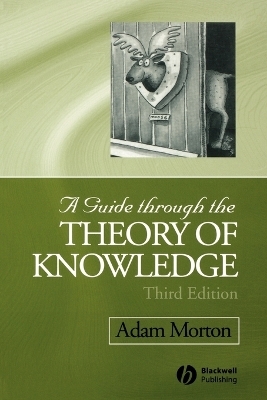
A Guide through the Theory of Knowledge
Wiley-Blackwell (Verlag)
978-1-4051-0012-0 (ISBN)
The third edition of this highly acclaimed text is ideal for introductory courses in epistemology. Assuming little or no philosophical knowledge, it guides beginning students through the landmarks in epistemology, covering historically important topics as well as current issues and debates.
Adam Morton is Professor of Philosophy at the University of Oklahoma. His publications include Frames of Mind (1980), Disasters and Dilemmas (Blackwell, 1991), and Philosophy in Practice: An Introduction to the Main Questions (Blackwell, 1995).
Foreword for Students viii
Acknowledgments x
1 Beliefs and their Qualities 1
1. Defending and Attacking Beliefs 1
2. Epistemic Ideals 2
3. The Basic Concepts 4
4. The Basic Questions of the Theory of Knowledge 9
5. Two Extreme Views 10
2 Perception 19
1. The Issues 19
2. The Concepts 20
3. Empiricism 22
4. Some Experiments 28
5. Evidence without Certainty 31
6. What is Special about Perception? 34
3 Apriori Beliefs 40
1. Knowledge Just by Thinking 40
2. Apriori, Analytic, Necessary 41
3. Kant on the Synthetic Apriori 44
4. Quine on the Analytic/Synthetic Distinction 47
5. Conceptual Truths 48
6. The Uses of Reasoning 51
4 Inductive Reasoning 57
1. Simple Induction 57
2. Hume’s Problem 58
3. Goodman’s Problem 59
4. Sampling 61
5. Solutions to Goodman’s Problem 63
6. Justifying Induction 65
7. The Safeness of Induction 66
8. IBE 67
9. Safeness Reconsidered 69
5 Middleword: Fallibilism 75
1. Error versus Ignorance 75
2. Foundationalism versus Holism 77
3. Fallibilisms 79
4. How the Web Changes 82
6 Defining Knowledge 88
1. Top-grade Belief 88
2. Lehrer’s Principle 91
3. Reliability: The Case of the Ancient Mariner 92
4. Missing Information 96
5. Knowledge and Trust 98
7 Externalism and Epistemic Virtues 104
1. The Escape from Justification 104
2. Externalism 106
3. Cousins of Knowledge 108
4. Skepticism and Knowing that You Know 109
5. Virtues 111
6. The Externalist Attitude 113
8 Knowledge of Minds 116
1. Psychological Beliefs 116
2. Self-centered Theories 118
3. Behavioral Theories 119
4. Folk Psychology 122
5. Materialist Theories 125
6. Errors of Self-attribution 126
7. Dispositions, Occurrences, and Reliability 128
8. Conclusion: The Indispensability of Psychology 131
9 Moral Knowledge 135
1. Knowing Right from Wrong 135
2. Thick and Thin Moral Beliefs 135
3. Analogies: Color, Humor, and Witches 138
4. Cognitivism 142
5. Knowing What You Know 144
10 Bayesian and Naturalist Theories 149
1. Why Probability? 149
2. A Guide through the Theory of Probability 151
3. The Bayesian Picture of Evidence 154
4. Objections to Bayesianism 157
5. Background Beliefs 160
6. Rationality Naturalized 163
7. Bayesianism versus Naturalism 167
11 Afterword: Some Future Epistemology 173
Definitions 180
Appendix for Teachers 184
Index 190
| Erscheint lt. Verlag | 12.7.2002 |
|---|---|
| Verlagsort | Hoboken |
| Sprache | englisch |
| Maße | 153 x 230 mm |
| Gewicht | 327 g |
| Themenwelt | Geisteswissenschaften ► Philosophie ► Allgemeines / Lexika |
| Geisteswissenschaften ► Philosophie ► Erkenntnistheorie / Wissenschaftstheorie | |
| ISBN-10 | 1-4051-0012-5 / 1405100125 |
| ISBN-13 | 978-1-4051-0012-0 / 9781405100120 |
| Zustand | Neuware |
| Haben Sie eine Frage zum Produkt? |
aus dem Bereich


